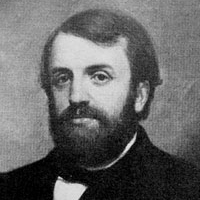 “Why God Used D.L. Moody, Part 5: His Entire Freedom from the Love of Money” by R.A. Torrey
“Why God Used D.L. Moody, Part 5: His Entire Freedom from the Love of Money” by R.A. Torrey
The fifth secret of D. L. Moody’s continual power and usefulness was his entire freedom from the love of money. Mr. Moody might have been a wealthy man, but money had no charms for him. He loved to gather money for God’s work; he refused to accumulate money for himself. He told me during the World’s Fair that if he had taken, for himself, the royalties on the hymnbooks which he had published, they would have amounted, at that time, to a million dollars. But Mr. Moody refused to touch the money. He had a perfect right to take it, for he was responsible for the publication of the books and it was his money that went into the publication of the first of them.
Mr. Sankey had some hymns that he had taken with him to England and he wished to have them published. He went to a publisher (I think Morgan & Scott) and they declined to publish them, because, as they said, Philip Phillips had recently been over and published a hymnbook and it had not done well. However, Mr. Moody had a little money and he said that he would put it into the publication of these hymns in cheap form; and he did. The hymns had a most remarkable and unexpected sale; they were then published in book form and large profits accrued. The financial results were offered to Mr. Moody, but he refused to touch them. “But,” it was urged on him, “the money belongs to you”; but he would not touch it.
Mr. Fleming H. Revell was at the time treasurer of the Chicago Avenue Church, commonly known as the Moody Tabernacle. Only the basement of this new church building had been completed, funds having been exhausted. Hearing of the hymnbook situation Mr. Revell suggested, in a letter to friends in London, that the money be given for completion of this building, and it was. Afterwards, so much money came in that it was given, by the committee into whose hands Mr. Moody put the matter, to various Christian enterprises.
This is the point at which many an evangelist makes shipwreck, and his great work comes to an untimely end. The love of money on the part of some evangelists has done more to discredit evangelistic work in our day, and to lay many an evangelist on the shelf, than almost any other cause. While I was away on my recent tour I was told by one of the most reliable ministers in one of our eastern cities of a campaign conducted by one who has been greatly used in the past. This evangelist of whom I now speak came to a city for a united evangelistic campaign and was supported by fifty-three churches. The minister who told me about the matter was himself chairman of the Finance Committee.
The evangelist showed such a longing for money and so deliberately violated the agreement he had made before coming to the city and so insisted upon money being gathered for him in other ways than he had himself prescribed in the original contract, that this minister threatened to resign from the Finance Committee. He was, however, persuaded to remain to avoid a scandal. “As the total result of the three weeks’ campaign there were only twenty-four clear decisions,” said my friend; “and after it was over the ministers got together and by a vote with but one dissenting voice, they agreed to send a letter to this evangelist telling him frankly that they were done with him and with his methods of evangelism forever, and that they felt it their duty to warn other cities against him and his methods and the results of his work.” Let us lay the lesson to our hearts and take warning in time.
~ from Torrey’s “Why God Used D.L. Moody“


